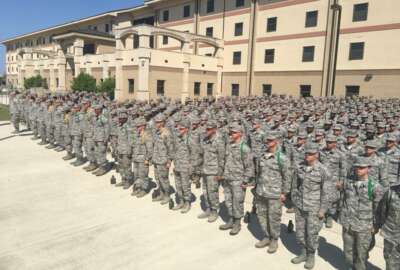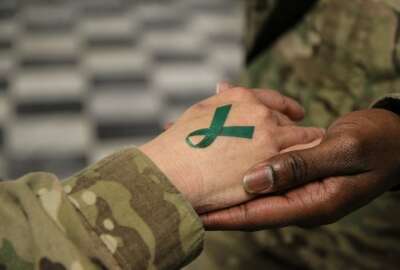
New sexual assault policies across the military
Experts estimated around 20,000 people are assaulted in the military each year. The Army, Navy and Air Force are implementing new policies aimed at reducing...
Best listening experience is on Chrome, Firefox or Safari. Subscribe to Federal Drive’s daily audio interviews on Apple Podcasts or PodcastOne.
Military branches are taking a tougher stance to combat sexual assault to create safer environments for soldiers and encourage victims to come forward.
The Army, Navy and Air Force are implementing new policies aimed at reducing assaults. The Defense Department has been battling sexual assault incidents for years and is in the process of implementing more than 80 recommendations from an independent review commission that finished its work last year.
Experts estimated around 20,000 people are assaulted in the military each year, said Don Christenson, the former chief prosecutor for the Air Force and current president of Protect our Defenders.
Here’s what you need to know about the new policies.
Navy’s two victim advocacy policies
The Department of the Navy is implementing two new initiatives to combat sexual assault, including the Safe to Report and the No Wrong Door policies getting victims care faster.
The Safe-to-Report Policy eliminates barriers for service members to report sexual assault by protecting any sailor, Marine, cadet or midshipman who reports a sexual assault from discipline for minor misconduct surrounding the sexual assault.
Minor misconduct includes drinking underage; unprofessional relationships; or violating orders about curfews, off-limits locations, school standards or barrack policies at the time of the sexual assault.
“Choosing to report a sexual assault is already a major decision for a survivor,” Navy Secretary Carlos Del Toro said in a press release. “It is a first step to accessing the services they need and the justice they deserve. Removing this barrier empowers victims and survivors — they should not have to choose whether to implicate themselves by reporting a crime committed against them.”
Before the policy, there were no protections from disciplinary actions for the victims who may have been breaking rules at the time of sexual assaults. Removing the barriers will increase the victims’ trust in the department and improve their care, the Navy says.
“Collateral misconduct by the victim of a sexual assault is one of the most significant barriers to reporting because of the victim’s fear of punishment,” Andrea Goldstein, assistant director for the Navy’s Force Resiliency, said in a press release.
Christenson told Federal News Network “the DoD’s own numbers show about 60% of men and women who report sexual assault suffer retaliation afterward. That really disincentivizes them to continue with the process.”
The new policy will instruct commanding officers how to decide if misconduct is considered collateral and to collect data for the department to gauge when and how frequently victims use the protections.
While sexual assault impacts all the services, Christenson said the Marine Corps has the highest rate of sexual assault of any of the armed services. He also said that certain Navy bases are particularly affected.
With only a fraction of survivors actually filing reports, even less go to trial. In fiscal 2020, only about 4% of all reports ever went to court, Christenson said.
Del Toro also announced a No Wrong Door Policy to create a new system for getting faster help for victims of sexual assault, sexual harassment and domestic abuse.
Victims who contact anyone in the Navy’s victim care and support offices will now always receive services from the office or be directly connected to another appropriate service provider.
All people responsible for caring and supporting victims will be trained by the agency to ensure victims receive a “warm handoff.”
Those offices include the Sexual Assault Prevention and Response Program, Family Advocacy Program, Military Equal Opportunity Program, Victim Witness Assistance Program, medical professionals, Warfighter and Family Services (non-medical counseling providers), Victims’ Legal Counsel or chaplains.
The Navy will also now follow up throughout the process to ensure offices are meeting the victims’ needs.
“I want to ensure that the victims and survivors of sexual assault, sexual harassment and domestic abuse receive the right care and quality services they need with minimal delay,” Del Toro said in a press release. “The Department of the Navy is committed to the well-being of the victims and survivors, from report to referral, from initial appointment to continuing care.”
Regardless of which office victims of sexual assault contact for support, the answer should always be, “I will help you,” Ashish Vazirani, interim director of the Navy’s Sexual Assault, Sexual Harassment, and Suicide Prevention and Response Office, said in a press release.
As the branches implement policies, data shows more survivors slowly come forward. Over the last 10 years, the number of survivors across the military reporting sexual assault has nearly doubled.
In 2020, about 5,600 men and women came forward and reported sexual assault, but just a decade ago, that number was around 2,500, Christenson said.
“Part of that could be an increase in sexual assault. The military hopes that a lot of that is because of programs that Congress and the services have instituted to get more survivors to come forward,” Christenson said.
Army’s new oversight office
Following the Navy’s lead, the Army updated the sexual assault policies as well, releasing two new initiatives: the Safe to Report policy and The Office of Special Trial Counsel.
The Safe to Report policy is nearly identical to the Navy’s policy encouraging victims to come forward and shielding them from punishment for minor misconduct during the assault.
The Army’s policy will protect their service members and cadets, regardless of whether the investigation or prosecution is handled by military or civilian authorities.
Once again, commanders will consider many factors when deciding what counts as minor collateral misconduct including the victim’s age and military experience level or whether the subject is in a position of authority over the victim.
The new Office of Special Trial Council will investigate sexual assault reports. The office, which reports directly to Secretary Christine Wormuth, will take over independent prosecution of specific crimes starting on Dec. 28, 2023.
The 2022 National Defense Authorization Act outlined the 11 specific crimes the OSTC will have exclusive authority to prosecute. Those crimes include murder, manslaughter, rape and sexual assault, rape and sexual assault of a child, sexual misconduct, kidnapping, domestic violence, stalking, retaliation, child pornography and wrongful broadcast.
Currently, sexual assault cases are prosecuted by judge advocates assigned to the local Offices of the Staff Judge Advocate and Special Victim Prosecutors of the Trial Counsel Assistance Program, Army Spokesperson Matt Leonard said to Federal News Network.
OSTC will not have control for another year because the council is still in its initial operating phase and has not reached its full operational status.
When OSTC does take over, the office will decide to send a case involving a covered offense to a court-martial rather than the local convening authorities or commanding officers and will handle the litigation of these courts-martials, Leonard said.
Air Force’s discharge policy
Instead of easing collateral consequences for reporting, the Air Force is strengthening their process to discharge airmen and guardians who commit sexual assault.
Under its new policy, service members who commit sexual assault will be subject to immediate initiation of discharge procedures. Only in very few circumstances can an airman or guardian be considered for an exception.
The Air Force’s updated policy combines two previous stand-alone rules regarding sexual assault in order to be more comprehensive. The new rule also limits exceptions where assaulters would have the opportunity to stay in the service.
Exceptions are now barred if a child is assaulted or if an airman or guardian has a prior assault or harassment charge. The service will also no longer consider exceptions relating to personal, family or financial circumstances, good military character and medical or mental health condition.
Going forward
Christenson said while the new policies will hopefully alleviate some of the issues with retaliation for reporting, there still are barriers that remain with prosecution sexual assault charges.
As of 2020, the DoD lost about 80% of the few cases that went to trail in cases of sexual assault or rape, he said.
All of these policy changes come nearly a year after, the Department of Defense announced it changed its policy to address issues with its sexual assault and prosecution process.
DoD is in the process of removing sex crimes and related crimes like domestic and child abuse from the military’s oversight and giving them to independent civilian agencies.
DoD also added sexual harassment as an offense in the Uniform Code of Military Justice and is creating offices in each military department to handle the prosecution of special crimes with appropriate legal oversight and guidance from the Pentagon.
“For survivors who go through the investigation and the court martial process, which can be very abusive, to see 80% of the time, their rapists walk free is not a good message to those who are thinking about reporting,” Christenson said.
Copyright © 2025 Federal News Network. All rights reserved. This website is not intended for users located within the European Economic Area.
Abigail Russ is an intern with Federal News Network.






